The Caged Girls: Yoga Pants, Sticky Mats & Freedom (Chapters Six Through Ten).
Read Part One of The Caged Girls: The Prologue Through Chapter Three.
Read Part Two of The Caged Girls: A Life in the Mind (Chapters Four & Five).
Part Three: Yoga Pants, Sticky Mats & Freedom.
Chapter Six.
I look down the length of my slim legs, covered in orange and purple, sunset-patterned yoga pants.
I plant my hands shoulder-distance apart and reach my right leg long behind me, hugging my left thigh in tightly. I press up into this hugged-leg variation of handstand and hold it for almost three breaths before coming back down.
My daughter catches me watching her as she prepares to practice her own three-legged downward dog on her scaled-down, matching mat next to mine.
I’m overjoyed in a way that I’ve never felt before—I can’t believe this tiny lady actually wants to practice yoga with Mommy—she asked me—and I’m frequently in awe of the fact that I love this practice, in general, so much.
I was never an athletic kid, like my little girl. I was not a person who relished sweating and panting and team-played sports—I was not this person until I found yoga.
Sure, I swam and I ran and I hiked and I exercised, but I never authentically enjoyed the sensations of physically moving within the structure of my body, the way that I do when I’m in clingy leggings on a sticky mat.
Returning to my practice, I move and breathe and flow and, alternately, observe my mini yogini out of the corner of my eye.
Inhale, arms sweep up—she, too, reaches arms high, only their relative shortness to her head makes her wonder if she’s doing the pose incorrectly, so different is hers from mine.
Exhale, forward fold—she comes down to her knees and looks up at the television screen, where another seasoned yogi is giving us our cues.
Inhale, halfway lift—she takes a break and plops down in front of her primary-colored piano.
Exhale, step back to downward-facing dog—she returns my gaze and hops onto her tiny mat to rejoin me.
After our physical practice is over, I make us three slices of peanut butter-honey toast, cutting gooey bite-sized pieces up for her. I have a coffee in my green ceramic, handle-free mug and she drinks mango juice out of her sippy cup—the one with her name in bubble letters on the side for when she takes it to preschool.
She wanders over to the blinds and shifts the curtains just enough to open and close her small fist—waving and saying hi to her daddy shoveling snow.
The ease with which these two exchange their love leaves me feeling like an outsider.
I move intentionally from my own finished-practice kneeling position to child’s pose; my forehead resting on the firm, waffle-textured rubber mat.
I’ve shifted here because I feel tears welling up from behind my eyes and I don’t want her to see them spill over.
I don’t cry easily—I have luculent day dreams of violent wailing because I know how good it feels to cry. Instead, I’m the woman with red, puffy eyes looking away from the grocery store clerk ringing up my kefir and beer because my body chose to let go in the middle of a day full of errands.
My breath hitches—no longer the smooth, skillful yogi—and she moves swiftly from behind the parted curtains to standing in front of me on my purple mat—our purple mat. She takes my hair in her left fist and tugs. I resist—she’s trying to make me look to her, to see if I’m okay.
Although a toddler, she’s authoritative—I think I’ve mentioned this—and, before I can help it, my wet eyes have met her confident ones.
My breath slows.
Inhale.
Exhale.
Inhale.
Sigh.
I hear clomping foot stomps on the wooden porch on the other side of the large front picture window—those panes of glass the only things separating our purple sticky mat and him.
I inexplicably recall something that he said to me after I’d finished writing my first book.
He’d loved it—truly—but he said that he was disappointed I hadn’t written more about my yoga practice—he thinks it’s a major part of my life, of who I am—and of who I’ve allowed myself to become.
He opens the front door and embraces our just-above-the-knee person, clinging to his snow-covered pant leg.
We talk for a minute, and then I take my green ceramic mug into our bedroom. I close the thin door and open my laptop’s two hard pieces of plastic, resting on our bed’s turquoise quilt.
I look down the length of my slim legs, covered in orange and purple, sunset-patterned yoga pants…
Chapter Seven.
So the reason for my child’s pose, purple mat tears yesterday was that he and I had a fight.
But not just any fight—one that I started.
While I don’t get off on fighting, I also won’t avoid it—it’s a necessary evil of both a strong relationship and one composed of two strong people—which is why we work so well and have for nearly 20 years—because we won’t let ourselves be bulldozed by the other partner, but we’re in love and compassionate and compromising.
Sometimes, though, I feel like I’m not meant to be around others.
I see myself curtained—cocooned—in sheer, white tulle that canopies my beckoning mattress—my siren—in the middle of the forest. My familiar turquoise and brown-textured notebook is there, along with my preferred ballpoint pen. I’m not wearing phony fairy wings, but I’m equally not my same, assumed human form.
It’s quiet here—completely still—except for a light wind ruffling the tree branches high overhead, but not my loose brown hair (because of the translucent curtains). It’s soundless, too, except for a swaying breeze, coupled with a hidden source of falling water (so soft that it’s almost inaudible, but it’s loud because of this relative silence).
And I’m alone—but nestled deeply within my breast is the critical knowledge that I’m loved—and that’s when my sheer, white, gauzy curtains part and I peek out from my self-imposed wilderness to see, on the other side, my light-colored wood floor waiting patiently—and my red microfiber sofa waits too, littered with stuffed animals and soft Disney-themed blankets—and I know that I’m not meant to be by myself after all. I just need some space once in awhile.
To breathe.
Chapter Eight.
I was always slightly terrified to have a baby girl.
Obviously, I was elated and excited—tiny nails to paint, little jewelry items to make especially for her—but there are so many other aspects of womanhood that, put simply, aren’t easy.
I consider myself a strong woman—often obnoxiously so. However, even the most resilient, refined women will encounter discrimination, prejudice and difficulty within the walls of society’s birth-gifted pink and metal cages. I don’t mean to place a lack of importance on how far we’ve come or on how much work and determination it took the women before us to get here. Still, we have a long way to go.
Yet the thing that surprised me most about mothering an infant daughter was that nearly all of my concerns flew out an open window almost immediately after she was born—because she is truly her own tiny lady and, in many ways, she’s nothing like me—and then these previous worries were replaced with new ones. She would have her own, separate battles and I would have to learn to see her and her life through new eyes and not those of my own prior experiences. (Easier said than done.)
For example, when I’m hurt or upset I lash out aggressively. She, on the other hand, holds things in—the epitome of a velvet-gloved fist. Also, I love food, was never a picky eater and had to learn to balance enjoyment and health (and all of the various combinations of these two where diet and my body are concerned). She is, contrarily, a horrifyingly picky eater and she does love food, too, but she—even at age two—never hesitated to leave the last several bites of chocolate cake on her plate—or refrain from eating it entirely if she wasn’t interested. But, don’t be fooled—the strongest differences between us have largely nothing to do with her and everything to do with me.
I spend much of my time as a mother battling my own intricate personality, so that I might spare her from being affected harmfully and unnecessarily from it—from me.
She’s naturally easy-going and charming and I—while, ahem, surely, charming myself—am not such a text-book definition of an ideally placid temperament.
I wrote my first book for her, actually—it was my first birthday gift to her.
I wanted her to have deep insight into my long-term relationship with her father as well as into my complex inner-workings. And yet.
And yet.
One of our most interesting discrepancies is that I’m clearly a word person and she doesn’t seem to need them much. She’s better than my words will ever be—because she’s absolutely, one-hundred percent filled with heart.
I’ve met a lot of different people in my life and none of them, regardless of age or gender or sex, have ever been as appealing soulful, intuitive or filled with some quality that I can’t even find a word for.
Her spirit is just huge—it’s ginormous. She’s gigantic.
She’ll never fit inside of a cage—and it’s my job, as her mother, to repeatedly keep giving her the keys to get out if she happens to ever be placed within the confines of one—either by herself or by another—and it’s my job, equally, to help her remain free—as free as she is right now tugging on my sleeve and handing me her pink coat to head out for a new Mommy and tiny lady adventure.
More, it’s in my best interest to not forget how much she has to teach me—and that sometimes it’s more important to listen than to find the right words to offer in return.
Chapter Nine.
Volcanic glass quakes and churns and boils within the central core of my being.
My eyes want to glaze over, my hands want to dig into hair and tears beg to flow down my bent legs, hugged closely into my chest.
The burning of all the things I want to say eats a dangerous crater near my heart.
The words that I let erupt, though, are all wrong and make everything worse—they make me worse.
Occasionally, a chunk of my volcanic-glass soul breaks off and, in it, I see who I am.
They say that obsidian—true volcanic glass—offers a person insight into her authentic self, even though this glimpse might not be what’s desired.
But my volcanic heart shows me enough.
I tried so hard today to be a good mom.
Today was a day full of special, little things intertwined together in an attempt to make a little girl happy. And yet today was the kind of day when nothing seemed to work. Each little moment was accepted and enjoyed graciously, but every waking second filling the gaps in between—what I like to call life—felt as poisoned as that ill-fated apple—I felt poisoned; polluted.
My chest expands and becomes concave as my breathing settles into normalcy and my fingers dance across my laptop keyboard.
This solitary confinement—in my bedroom with my space heater as white noise—loosens my volcanic core, but my sun—my beloved, occasionally overwhelming child—has begun to set for the evening and my heart now feels brittle and cold as ice.
And that’s the thing about motherhood—we’re not entirely free to be ourselves, because we should be cautious and courteous about what’s best for our baby girls.
Although it’s in her best interest, certainly, to have a mother who expresses her own feelings and who encapsulates a real human being, it’s also more than appropriate to maintain some sort of acting ability, for the sake of her own tender emotions.
Yet I think that’s the other thing: I’ve never exactly been a tender sort of girl.
Yes, I’m tender and fragile and wildly soft in many ways typically feminine, but I—like many young and old girls—am also wildly fierce and strong and capable entirely of masculinity—more so than many men—and why should we be so contained within our girlhood to not explore this…bitch?
Regardless, I feel myself closing down for the night. The entrancement of playing this mothering game has been more than enough for one day; while I need my turn to dance with my alphabet-littered keys, I wouldn’t dance with any other partner so often as I do with her.
Chapter Ten.
She sticks her wriggling arm through the puffy, pink jacket sleeve.
She’s determined to get her coat on all by herself.
She has the wrong arm in the wrong sleeve, but I don’t tell her. Instead, I type a few more words and let her see this puzzle piece for herself.
I tip my head to her again and see that she now has the correct arm inside of the correct coat sleeve. I sportingly hold out the other one so that she’s able to slip her tiny hand inside. She does and now she’s fiddling with the cold metal zipper.
I start the zipper at the bottom for her and listen to her struggle and whine a little in frustration, but then she stops and I can hear her talking herself through it—she has more patience as a rightly frustrated toddler than I do as a thirtysomething woman.
She giggles and I see my two favorite dimples in the world light up the room.
Her zipper—pulled up high enough for her satisfaction, although it’s barely to the middle—has lost it’s appeal; with her coat now completely on, she walks over to her pink and white table to grab her blue fedora-style hat and then struts mindfully over to the rainbow-medley carpet by the front door for her boots.
I hear little spurts of coat-rubbing-against-coat activity and uh’s and umph’s and hhha’s as she plays with getting on her shoes. Then I hear clomp-clomp-clomp as she pitter-patters over to me; lone purple boot in hand.
One shoe on, she’s trying to put a second pair of florescent pink fleece pants over-top her jeans. (Apparently, she thinks we’ll be taking off into the rather arctic Midwestern winter temperatures.)
I clickity clack on my keyboard for one more second before I realize that it’s time to hit save and close my laptop’s hard plastic covers—because words will never be the most important thing in my world, even if I can’t live without them.
And then the searing memory of that debilitating, all-encompassing pain—of when I thought I was going to lose her—moves from my mind to my stomach to my bones. No, there’s only one thing in this world that brings absolute joy, light, healing power and health—and that’s love. (Although yoga pants and sticky mats don’t hurt.)
Photo credits: Dominic Robinson/Flickr; tanahelene/Flickr; Author’s own.
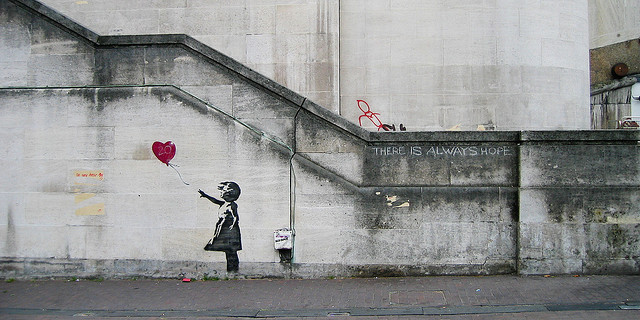
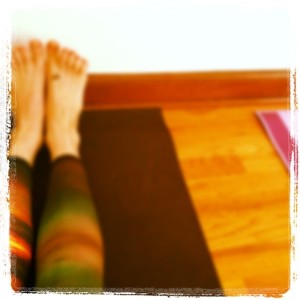

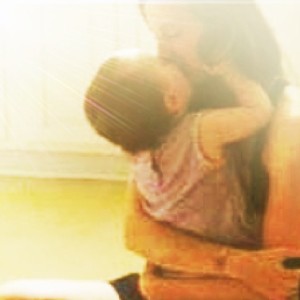
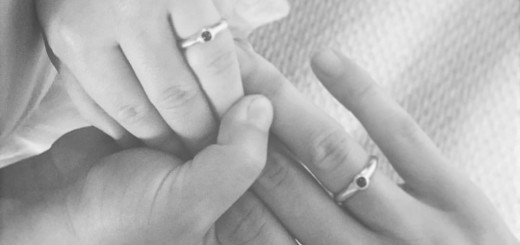

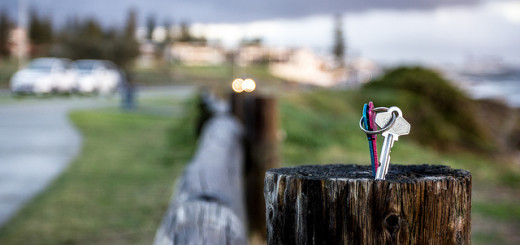
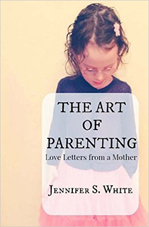
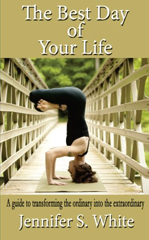
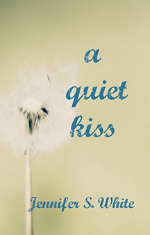
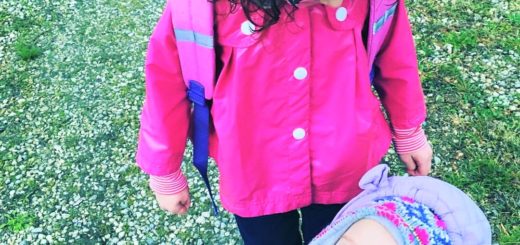
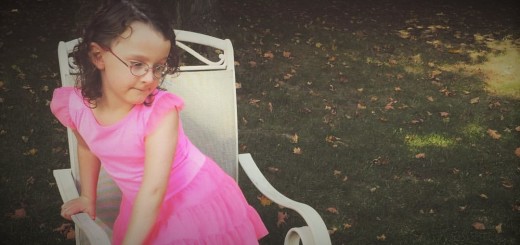
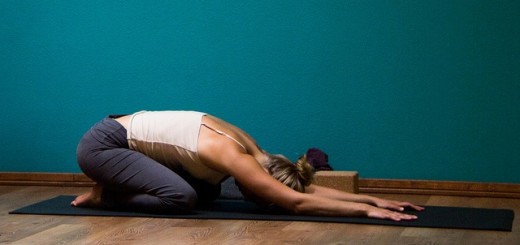
2 Responses
[…] 4. Yoga. As one of my teachers said to me this weekend, practicing yoga is practicing connecting what you’re thinking with what you’re doing. If you’re driving your car, you’re thinking about driving your car. Trust me, all of us need to practice this. Why? Because we’ll get more fulfillment out of what we’re doing, and because there’s so much joy in the little things that we miss when we let our minds wander. […]
[…] a time, she simply shoved it deep down and played with her daughter and felt nauseous and the beginnings of roundness, and all that comes with impending motherhood. […]